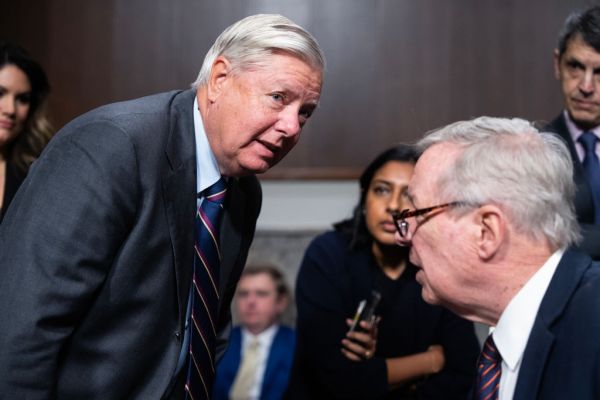Happy Tuesday! Your TMDers are all willing to step up and take one for the team, but we don’t think any of us are capable of the self-sacrifice it took for Robert F. Kennedy Jr. to eat McDonald’s on Donald Trump’s private plane this weekend. “Make America Healthy Again” is off to a great start!
As a new administration takes shape, we’re gearing up to cover a very different Washington—and if you’re looking to get even more out of The Dispatch, we encourage you to check out Dispatch Premium.
Premium members unlock our best perks—uninterrupted access to our reporting and podcasts, deeper reporting and analysis, and exclusive ways to engage with our team of reporters and editors. Dispatch Premium includes three annual memberships, ad-free reading and listening, VIP access to events, and more.
Quick Hits: Today’s Top Stories
- Masked men stole at gunpoint the contents of more than 100 trucks carrying humanitarian aid into Gaza on Saturday, according to the U.N. Relief and Works Agency for Palestine Refugees in the Near East (UNRWA). The trucks had entered southern Gaza through the Israeli-controlled Kerem Shalom crossing. “We have been warning a long time ago about the total breakdown of civil order” in southern Gaza, said UNRWA commissioner Phillipe Lazzarine. “It has become an impossible environment to operate in.”
- The U.S. State Department announced Monday that it would impose sanctions on the Israeli Amana settler group, as well as associated individuals and entities, for allegedly helping to perpetrate attacks on Palestinians in the West Bank. “We once again call on the Government of Israel to take action and hold accountable those responsible for or complicit in violence, forced displacement, and the dispossession of private land,” Department spokesman Matthew Miller said in a statement.
- Kremlin spokesman Dmitry Petrov said Monday that President Joe Biden’s decision to allow the Ukrainian armed forces to conduct long-range strikes inside of Russia using American-supplied missile systems was “adding fuel to the fire and provoking further escalation of tensions around this conflict.” While military experts largely agree that the weapons will not radically change the conflict, officials have suggested that the U.S. move was prompted by the deployment of North Korean troops to the front lines in support of Russia. German Chancellor Olaf Scholz, asked on Monday at the G20 Summit in Rio de Janeiro if his country would now provide cruise missiles to Ukraine, said that his position against it was unchanged.
- President-elect Donald Trump nominated Brendan Carr for the chairmanship of the Federal Communications Commission (FCC) on Sunday night. Carr, who is the ranking Republican on the FCC, has been a fierce critic of social media companies over free speech and censorship issues. In a post on X after the announcement, Carr said, “We must dismantle the censorship cartel and restore free speech rights for everyday Americans.”
- The U.S. budget airline Spirit Airlines said Monday it had filed for bankruptcy. The low-cost carrier, which has lost $2.5 billion since 2020 and faces loan payments of more than $1 billion over the next two years, has struggled to compete with larger carriers and failed in its efforts to merge with Frontier Airlines and JetBlue.
- President Joe Biden requested $98 billion from Congress on Monday to fund relief efforts stemming from recent natural disasters, including Hurricane Helene and Hurricane Milton. The number is nearly five times the amount Congress allocated to the Federal Emergency Management Agency at the start of fiscal year 2024, but $42 billion of the requested funds would go to other agencies, such as the Department of Housing and Urban Development, the Department of Agriculture, and the Environmental Protection Agency.
- The White House, local politicians, and leaders of Jewish groups on Monday condemned a neo-Nazi march that took place over the weekend in Columbus, Ohio. A small group of masked individuals carrying Nazi flags and chanting racist slogans marched through the city’s downtown on Saturday. “We will not tolerate hate in Ohio,” said Gov. Mike DeWine, a Republican, on X. “Neo-Nazis — their faces hidden behind red masks — roamed streets in Columbus today, carrying Nazi flags and spewing vile and racist speech against people of color and Jews.” The march comes days after protesters waved Nazi flags outside of a theater production of The Diary of Anne Frank in Michigan.
Horseshoe Theory Meets the Intelligence Community

In March 2019, a Democratic congresswoman running in her party’s presidential primary appeared on The Late Show with Stephen Colbert for a standard candidate interview. Colbert asked Tulsi Gabbard a curious question: “You’ve gotten some fans in the Trump supporter world. David Duke, Steve Bannon, and Matt Gaetz,” Colbert said. “What do you make of how much they like you?”
“You should ask them,” Gabbard replied, going on to denounce Duke by name. But she didn’t reject the support from Bannon or Gaetz.
More than five years later, President-elect Donald Trump picked the former Democratic rising star to lead the Office of the Director of National Intelligence (ODNI). The selection follows Gabbard’s formal exit from the Democratic Party in 2022 and embrace of Trump during the 2024 campaign. But the roots of her transformation have been clear for years: She brings an isolationist outlook and a hostility toward the foreign policy establishment that helped her gain popularity among hard-right Trump supporters.
But some Democratic lawmakers and former officials are now raising alarms over Gabbard’s nomination for a role leading the 18 agencies and organizations that make up the intelligence community and shepherding the sensitive information that fuels the foreign policy apparatus she’s built her political career on antagonizing.
The 43-year-old represented Hawaii’s 2nd Congressional District for four terms, from 2013 to 2021, and sat on the Homeland Security, Armed Services, Foreign Affairs, and Financial Services Committees. She opted out of running for another term in the middle of her long-shot bid for the 2020 Democratic presidential nomination.
In a crowded primary field, Gabbard tried to distinguish herself on foreign policy, leaning on her first-hand experience deploying to Iraq and Kuwait as a member of the Hawaii Army National Guard. She served in a medical unit in Iraq and as a military police platoon leader in Kuwait; she’s currently a lieutenant colonel in the U.S. Army Reserve. “I know the importance of our national security as well as the terribly high cost of war,” she said in the first Democratic primary debate in June 2019. “For too long our leaders have failed us, taking us from one regime-change war to the next, leading us into a new Cold War and arms race, costing us trillions of our hard-earned taxpayer dollars and countless lives.”
But Gabbard trained most of her fire at fellow Democrats, decrying party leaders like Hillary Clinton as part of a foreign policy establishment supportive of those “regime-change wars.” The approach didn’t get her very far in the 2020 primary, but it helped elevate her standing among anti-establishment and populist media figures like Joe Rogan and Tucker Carlson.
Gabbard did at times criticize the first Trump administration’s foreign policy, particularly pertaining to the Middle East. She claimed Trump had “taken steps to create a war with Iran” and described the U.S. assassination of Islamic Revolutionary Guard Corps commander Qassem Suleimani in January 2020 as an unconstitutional act of war. “Trump talked a lot in his campaign for the presidency, and even since he’s been in office, about how he wants to end forever wars, but his actions tell a different story,” she said at the time. In 2019, she accused Trump of using U.S. military assets as “prostitutes” to Saudi Arabia in the wake of an attack on Saudi oil fields, describing him as “unfit to serve as our commander in chief.” (Over the weekend, Gabbard sat behind Trump at a UFC event in New York while the president-elect chatted with Saudi sovereign wealth fund governor Yasir Al-Rumayyan.)
But she continued on her journey toward Trumpworld, publicly leaving the Democratic Party in October 2022. “I can no longer remain in today’s Democratic Party that’s under the complete control of an elitist cabal of warmongers driven by cowardly wokeness,” Gabbard said at the time. She endorsed Trump in August of this year, this time praising the foreign policy of his first term. “He not only didn’t start any new wars,” she said in her endorsement speech. “He took action to de-escalate and prevent wars.”
With her nomination, Gabbard’s past foreign policy statements are back in the spotlight, particularly those in which she veered from expressing simply dovish views into echoing and amplifying the narratives of American adversaries.
While in Congress, Gabbard met with Syrian dictator Bashar al-Asssad in 2017 and a few months later tried to cast doubt on U.S. intelligence assessments that al-Assad used chemical weapons against his own people. In 2022, the day after Russia invaded Ukraine, and following weeks of the Biden administration releasing intelligence reports that an attack was imminent, Gabbard laid the blame for Vladimir Putin’s war on the U.S. and NATO’s willingness to entertain the idea of Ukraine joining the alliance. Sen. Marco Rubio, now a fellow Trump Cabinet nominee, described Gabbard’s view as “simply not true.”
Four days later, she called for Ukraine to become a “neutral country.” As Ukrainian forces fought to keep control of Kyiv—a fight they would go on to win—Gabbard urged, “Presidents Putin, Zelensky, and Biden … to put geopolitics aside and embrace the spirit of aloha, respect and love.” The following month, Gabbard echoed a Russian narrative about U.S. biolabs in Ukraine that the Kremlin used as one of the justifications for the invasion. The false story had gained traction on far-right social media channels in the United States. “Tulsi Gabbard is parroting false Russian propaganda,” Sen. Mitt Romney said at the time. “Her treasonous lies may well cost lives.”
Since the invasion, Gabbard has drawn the praise of Russian media over her alignment with Kremlin positions; her frequent appearances on Tucker Carlson’s former show on Fox News provided both a platform for the talking points of Russian propagandists and a pretense of validation for their conspiracy theories. “She from day one clarified the reason for Russia’s special operation in Ukraine,” a Russian state TV anchor said last week in support of her nomination as DNI, according to a translation from CNN.
Some of Gabbard’s foreign policy pronouncements come across as more odd than anything else. “As we remember Japan’s aggression in the Pacific, we need to ask ourselves this question: is the remilitarization of Japan, which is presently underway, truly a good idea?” Gabbard said last December on the anniversary of the Pearl Harbor attack. “We need to be careful that shortsighted, self-serving leaders do not end up bringing us again face-to-face with a remilitarized Japan.” Japan has a mutual defense treaty with the U.S. and currently hosts nearly 55,000 American service members—more than any other country in the world.
With Gabbard having no formal intelligence experience, some former national security officials and lawmakers argue she is at best unqualified for the role and at worst a potential national security liability. “She’s no more qualified to be director of national intelligence than the chair you’re sitting in,” former Trump National Security Adviser John Bolton told TMD.
Gabbard has called for the pardons of Edward Snowden and Julian Assange, two men responsible for some of the most significant leaks of classified information in recent history. She has described the pair as brave whistleblowers who “exposed the deception and criminality of those in the deep state.”
“As a former CIA case officer, I saw the men and women of the U.S. intelligence community put their lives on the line every day for this country,” Democratic Rep. Abigail Spanberger said last week. “I am appalled at the nomination of Tulsi Gabbard to lead DNI.” Spanberger sits on the House Intelligence Committee.
The Director of National Intelligence plays a central role in coordinating and curating intelligence within the executive branch and communicating some of those unclassified findings to the public, often in testimony to Congress. ODNI is responsible for producing the president’s daily intelligence briefing, for example. But the office doesn’t play nearly as active a role as the Central Intelligence Agency in intelligence gathering.
It remains to be seen whether Gabbard will have sufficient GOP support in the Senate to be confirmed. In contrast to the reaction to the Matt Gaetz pick for attorney general, Republican senators have been more circumspect in their comments about Gabbard. “I would want to know about all that,” Sen. John Cornyn—a Texas Republican who sits on the Senate Intelligence Committee, the body Gabbard would have to clear before a full Senate vote—said when asked about her positions on Russia, Iran, and Syria. “I have no doubt that she’s a patriot, having served in the military, but those are responsibilities in the position of trust for the nation.”
Worth Your Time
- Donald Trump is back, and Europeans are rethinking their relationship to the United States—again. The Atlantic’s McKay Coppins reported on how the continent’s leaders are recalibrating the transatlantic alliance. “In the short term, sources told me, the plan is to cozy up to Trump and those close to him and hope for the best,” he wrote. “In the long term, a growing consensus has emerged that Europe will need to prepare for a world in which it no longer counts on America for protection.” But some leaders are less worried by the Americans than they are for them: “Bruno Maçães, a writer and consultant on geopolitics who has served as Portugal’s Europe minister, told me his phone had been ringing constantly since Trump’s election. … Maçães, like others I talked with, was eager not to be seen as hysterical or fatalistic. He said he didn’t think Trump’s foreign-policy appointments so far have been disastrous. But when he looked at the people Trump was naming to key domestic positions, most notably Matt Gaetz as attorney general, he found it hard to see anything other than a profound deterioration of political culture and democratic norms. ‘Americans have more reason to worry than the rest of the world,’ he said.”
- The country is facing yet another labor shortage: this time, among the ranks of Revolutionary War re-enactors. Ken Wells reported for the Wall Street Journal on how many historical costume enthusiasts are seeking to fill their ranks. “The U.S. has some 240 Revolutionary War re-enactor groups representing about 4,500 hobbyists, according to the Brigade of the American Revolution, a Pennsylvania-based umbrella group that tracks membership,” Wells wrote. “By comparison, Civil War re-enactors number about 25,000 to 30,000. During the run-up to the 1976 U.S. bicentennial, as many as 20,000 hobbyists signed up to participate in Revolutionary War re-enacting events, according to the Brigade. … The recruiting slump is all the more pressing as the nation prepares to celebrate its 250th birthday—the U.S. semiquincentennial—on July 4, 2026. While Revolutionary War battles are celebrated and re-enacted every year, many in the re-enactor community were expecting a surge in membership as the 250th anniversaries of key battles and other historic events draw nearer. But so far the community has mostly been disappointed, says James McKane, a Brigade board member.”
Presented Without Comment
New York Times: ‘Morning Joe’ Stars Reveal a Mar-a-Lago Reunion With Trump
“For those asking why we would go speak to the president-elect during such fraught times, especially between us, I guess I would ask back, ‘Why wouldn’t we?’” Ms. Brzezinski told viewers on Monday, disclosing the meeting for the first time. “Joe and I realized it’s time to do something different, and that starts with not only talking about Donald Trump but also talking with him.”
The meeting, at Mar-a-Lago, was their first in-person encounter in seven years.
In the Zeitgeist
In the crossover you didn’t know you needed, Martin Scorsese and Fox teamed up for a new series on the lives of the saints. As the great director said: “I didn’t believe it could be done.”
Toeing the Company Line
- In the newsletters: Kevin argued (🔒) that the national debt is the biggest threat to national security and Nick explored (🔒) how media is already readjusting to the incoming Trump presidency.
- On the podcasts: Sarah and David discuss the Supreme Court nomination process, last week’s Federalist Society Convention, and the Matt Gaetz AG appointment on Advisory Opinions.
- On the site: Bobby Miller unpacks Vivek Ramaswamy’s “national libertarianism” and Mike reports on Sergio Gor, Trump’s pick to run the Presidential Personnel Office.
Let Us Know
How much deference should the Senate give to a president’s Cabinet appointees?








Please note that we at The Dispatch hold ourselves, our work, and our commenters to a higher standard than other places on the internet. We welcome comments that foster genuine debate or discussion—including comments critical of us or our work—but responses that include ad hominem attacks on fellow Dispatch members or are intended to stoke fear and anger may be moderated.
With your membership, you only have the ability to comment on The Morning Dispatch articles. Consider upgrading to join the conversation everywhere.